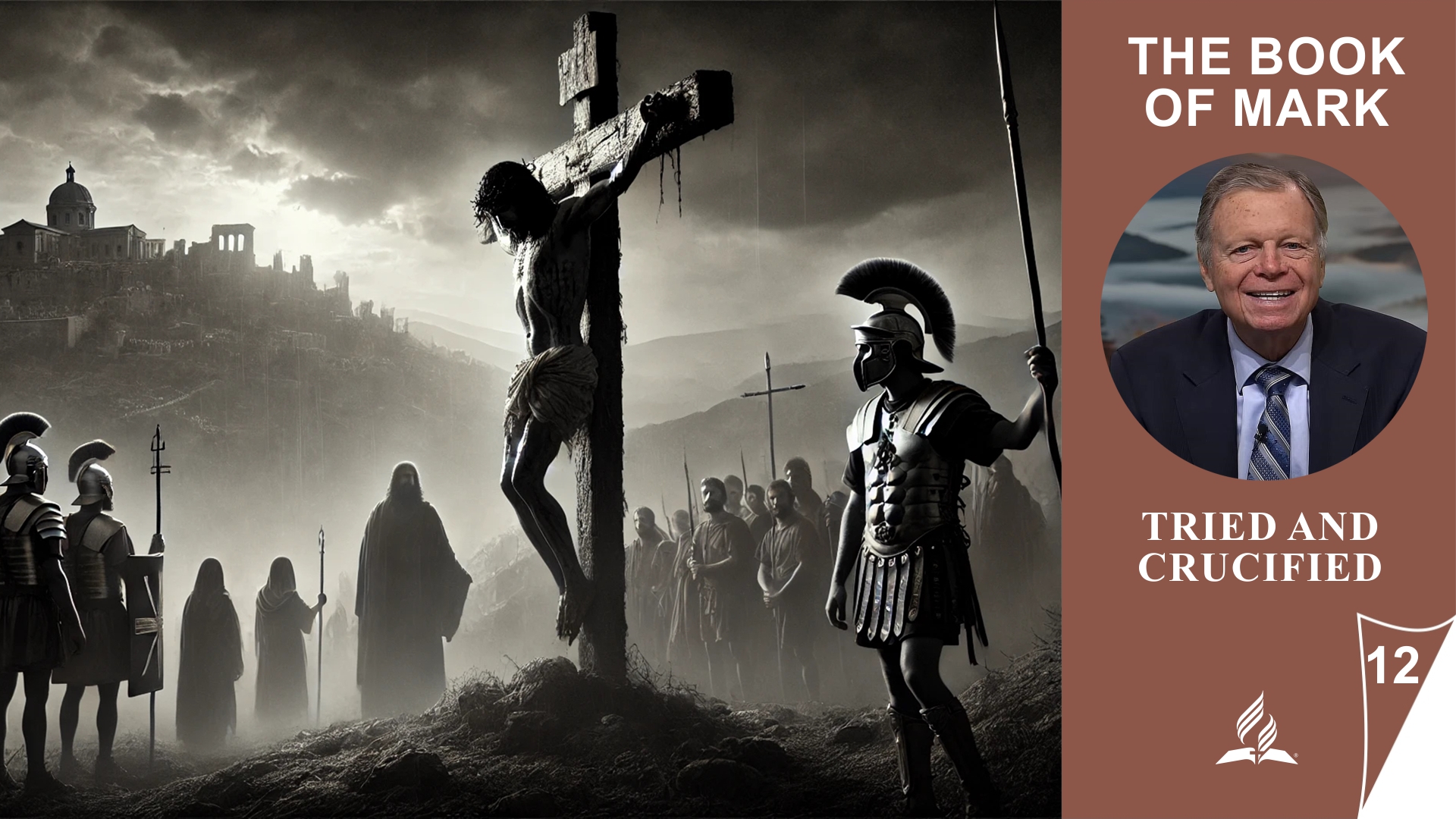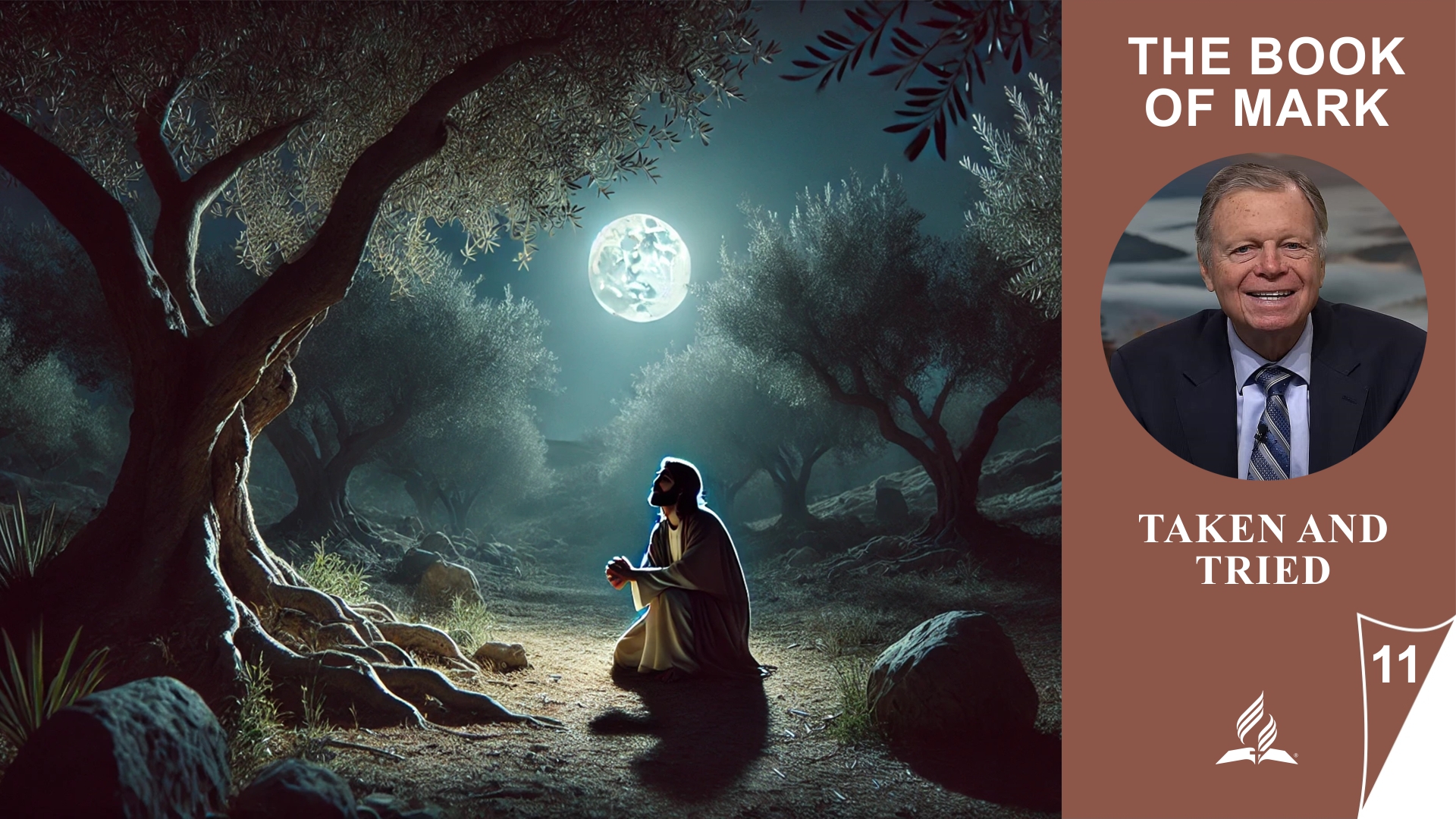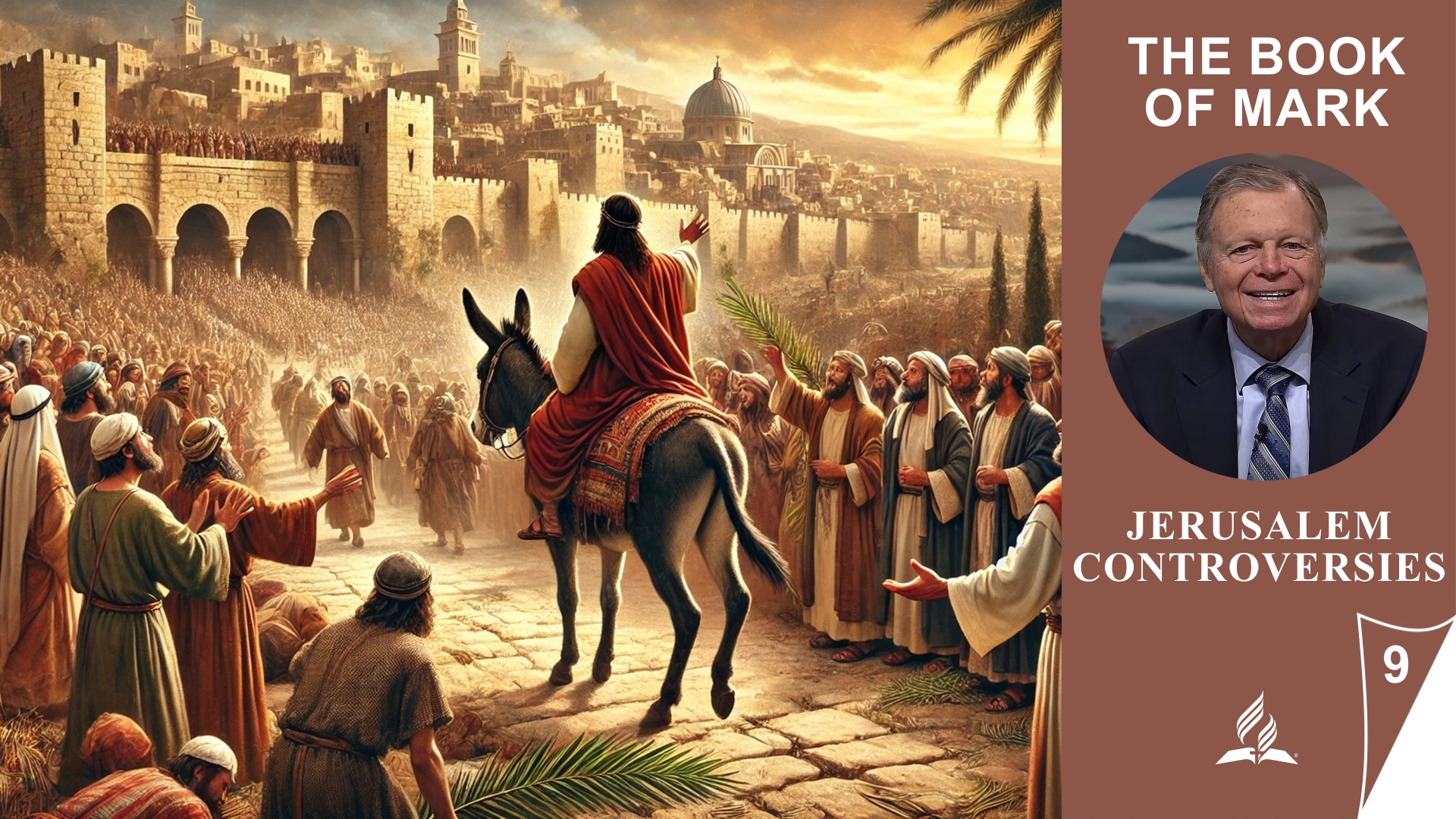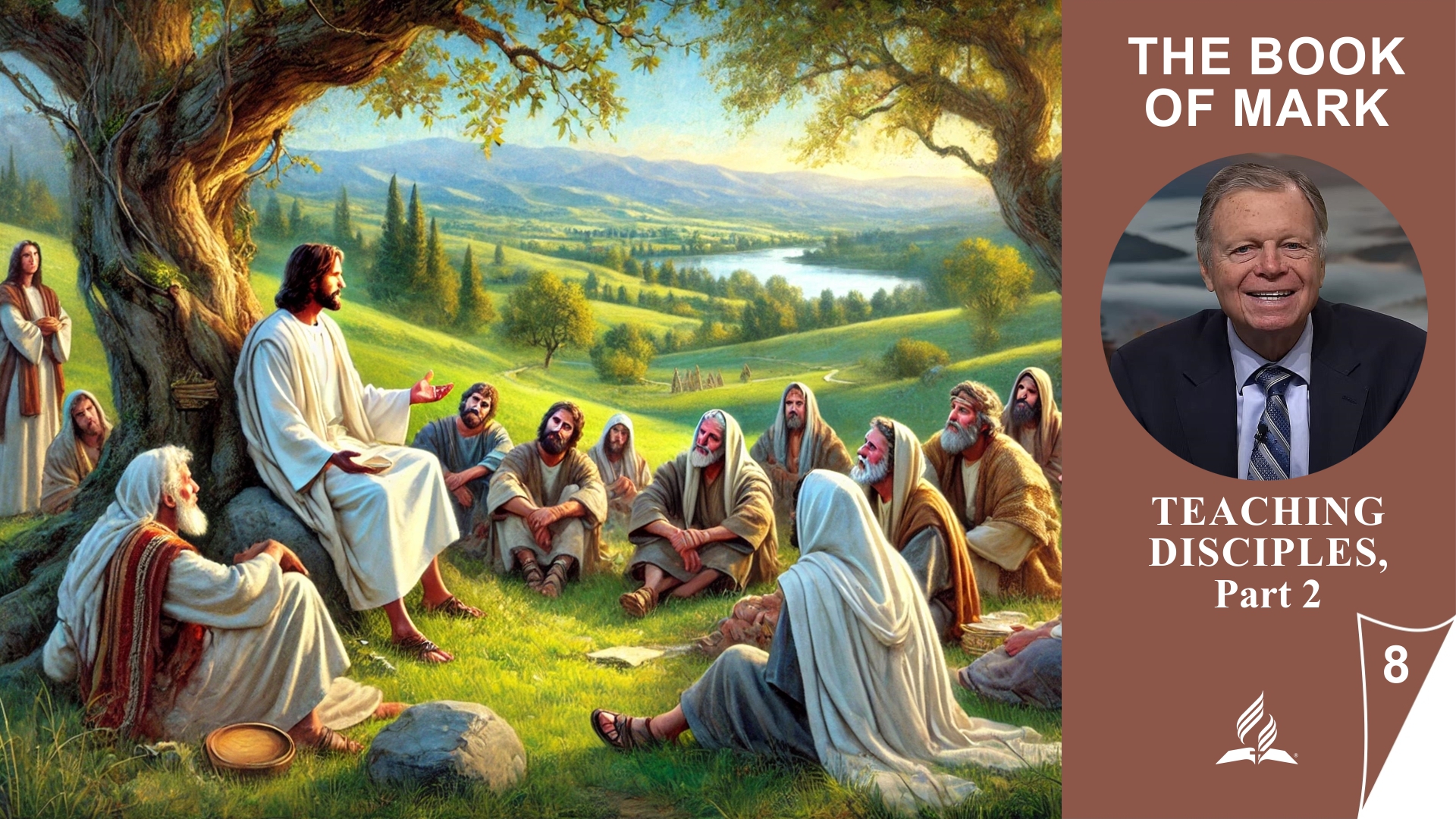
The Book of Mark – Lesson 11.Taken and Tried | Sabbath School with Pastor Mark Finley

Series THE BOOK OF MARK with Pastor Mark Finley |
Lesson 11.Taken and Tried |
Betrayal and Faithfulness: Jesus’ Final Path to Crucifixion |
Lesson 11 deals with the crucial events of Jesus’ last hours before His crucifixion. In the Garden of Gethsemane, Jesus is betrayed by Judas and arrested by the religious leaders. Despite the impending suffering, Jesus remains resolute in fulfilling the divine plan. In contrast, the disciples flee in fear, and Peter denies Him three times. Before the Sanhedrin, Jesus boldly testifies to His identity as the Messiah, which leads to His condemnation. This lesson highlights the themes of betrayal, denial, and Jesus’ faithfulness until the end.
Memory Text: Mark 14:36 – “And He said, ‘Abba, Father, all things are possible for you. Take this cup from Me; nevertheless, not what I will, but what You will.’ ”
Content:
11.1 Unforgettable
Devotion and Betrayal: An Unforgettable Contrast
In Mark 14:1–11, two stories are intertwined: the plan of the religious leaders to kill Jesus and the act of a woman anointing Jesus with precious perfume. These stories stand in stark contrast to each other. While the woman honors Jesus out of love and devotion, Judas betrays Him out of greed. Jesus describes the woman’s act as “good” and says it will be proclaimed in memory of her throughout the world. Conversely, Judas’ betrayal will also be unforgettable, but for entirely opposite reasons. This contrast between devotion and betrayal underscores the significance of both actions in the context of Jesus’ Passion.
11.2 The Last Supper
The New Covenant: Jesus’ Sacrifice and the Promise of Salvation
The Last Supper in Mark 14:22–31 has profound significance for the Christian faith, as Jesus establishes a new covenant here. The bread symbolizes His body, and the wine represents His shed blood, sealing the new covenant with God. This act recalls the covenant sealed by blood in Exodus 24:8 and marks a transition from the Passover to the new order of salvation. Jesus is depicted as the Lamb of God, whose sacrifice brings about the redemption of humanity. Despite the grim prediction that the disciples will forsake Him, Jesus offers hope through the announcement of His resurrection and the promise of meeting them in Galilee.
11.3 Gethsemane
The Cup of Suffering: Jesus’ Prayer and Acceptance of the Divine Will
In Gethsemane, Jesus prayed that the cup of suffering might pass from Him, yet only if it were God’s will (Mark 14:36). He expressed His deep, familial bond with God by addressing Him as “Abba, Father.” Despite His plea, His prayer was not answered in the sense of sparing Him from suffering. Instead, Jesus submitted to the divine will to enable the redemption of the world. The disciples, who should have supported Him, were asleep, highlighting His isolation and the forthcoming betrayal. In the end, Jesus was prepared to face His fate, while the disciples remained unprepared.
11.4 Leaving Everything to Flee from Jesus
Betrayal and Flight: The Fulfillment of the Divine Plan Despite Human Weakness
In Mark 14:43–52, Judas’ betrayal is a crucial moment in the plan of salvation. Judas betrays Jesus with a kiss, a sign of friendship, which accentuates the heinousness of his act. Despite the chaos that erupts during Jesus’ arrest, Jesus reminds them that all this is happening to fulfill the Scriptures. This underscores that God’s will is accomplished even through human betrayal and violence. The disciples’ flight reveals their fear and weakness, especially in the case of the young man who leaves everything to run away from Jesus—a symbol of human tendency to avoid suffering.
11.5 Who Are You?
Courage and Denial: The Contrast Between Jesus’ Steadfastness and Peter’s Weakness
In Mark 14:60–72, the contrast between Jesus and Peter is evident. While Jesus stands before the Sanhedrin and boldly reveals the truth about His identity as the Messiah, Peter outside denies his association with Jesus out of fear and weakness. Jesus remains steadfast despite false accusations and mistreatment, while Peter denies Him three times and ultimately breaks down when the rooster crows and he remembers Jesus’ prophecy. This contrast teaches us the importance of faithfulness and courage under pressure, showing that human weakness is not the end—Peter’s remorse points to the possibility of repentance.
11.6 Summary
Betrayal, Denial, and Steadfastness: Jesus’ Path Before the Court
Lesson 11 focuses on Jesus’ arrest and trial, beginning with Judas’ betrayal in the Garden of Gethsemane. Despite the chaos, Jesus remains calm and submits to the divine plan, while His disciples flee. Before the Sanhedrin, Jesus openly testifies to His identity as the Messiah, leading to His condemnation. Simultaneously, Peter denies Jesus three times out of fear. These events highlight the contrast between Jesus’ steadfastness and the disciples’ human weakness, yet there remains hope for repentance and redemption.
The Book of Mark – Lesson 10.The Last Days | Sabbath School with Pastor Mark Finley

Series THE BOOK OF MARK with Pastor Mark Finley |
Lesson 10.The Last Days |
Prophecies About the End Times – An Overview |
Lesson 10 deals with Jesus’ prophetic statements about the last days and the upcoming events that will shape world history. Jesus addresses the destruction of the Temple in Jerusalem as a significant sign and describes the associated “great tribulation” as a time of unprecedented persecution and testing. This lesson also highlights the “abomination of desolation” and the signs indicating Christ’s second coming. Central to the lesson are the warnings against false prophets and the promise of the future coming of the Son of Man, which conveys both hope and a call to vigilance. The lesson encourages believers to prepare for these crucial events and remain steadfast in their faith.
Memory Text: Mark 13:26,27 – “ ‘Then they will see the Son of Man coming in the clouds with great power and glory. And then He will send His angels, and gather His elect from the four winds, from the farthest part of earth to the farthest part of heaven.’ ”
Content:
10.1 Two Little Coins in the Offering
The True Meaning of Giving – An Example of the Widow
In Mark 12:41–44, we see Jesus praising a poor widow who puts two small coins into the offering box, which are worth very little. In contrast to the rich donors who gave out of their abundance, the widow gave out of her deep poverty, giving all she had to live on. Jesus emphasizes that her gift is worth more in God’s eyes than that of the rich, because she sacrificed everything she needed to live. This story shows us that it is not the amount of the donation that counts, but the devotion and heart behind the giving. Even if religious leadership may be corrupt, the sincere devotion of an individual remains valuable and blessed by God.
10.2 Not One Stone Left on Another
Unshakable Hope in Times of Upheaval
When Jesus foretold the destruction of the magnificent Temple, the disciples were understandably shocked. They wondered when this catastrophe would happen and what sign would indicate it. However, instead of focusing on the fall of the Temple, Jesus warns the disciples of the coming challenges: persecution, trials, and even the threat of death. He stresses that these trials are signs of the forthcoming events but should not overwhelm them with despair. The Holy Spirit will provide them with the necessary words and carry them through all difficulties. This message teaches us to hold on to God’s guidance and comfort despite external turmoil and trials.
10.3 The Abomination of Desolation
The Sign of Destruction – The “Abomination of Desolation” in the Light of Prophecy
In Mark 13:14, Jesus warns the disciples about the “abomination of desolation,” referring to the book of Daniel. This term signifies a severe desecration associated with the destruction of Jerusalem. While many scholars interpret the events under Antiochus Epiphanes as the “abomination,” the context of Jesus’ prophecy suggests it refers to the Roman occupation and the placement of pagan standards during the siege of Jerusalem in the 60s AD. This desecration was the sign for Christians to flee Jerusalem, which they did. The prophecy teaches us to be vigilant and correctly interpret the signs of the times to respond appropriately.
10.4 The Great Tribulation
Warning and Hope in Times of Persecution
Mark 13:19 describes a “great tribulation” unparalleled since the creation of the world and points to an extraordinary period of persecution. This future period will be considered more intense and comprehensive than the destruction of Jerusalem. The prophecy refers to the persecutions that God’s people will endure over a long period, as described in Daniel 7 and 8. God offers hope by promising to shorten the persecution for the sake of the people, as became evident after the Reformation. At the same time, Jesus warns against false prophets and false Christs who will appear during this critical time. This warning aims to encourage believers to remain vigilant and not be misled by deceptions.
10.5 The Coming of the Son of Man
The Promised Coming of the Son of Man – Signs and Promises
In Mark 13:24–32, Jesus describes the magnificent event of His second coming in glory, accompanied by spectacular signs in the sun, moon, and stars. This second coming is extensively covered in the New Testament by both Paul and Peter and detailed in Revelation. The prophecies emphasize that this event will be personal, visible, and audible, so that no one can miss it. Jesus explains that “this generation” refers to the first-century generation that will witness the destruction of Jerusalem, while “that day” refers to the far-off future coming of Christ. This distinction helps clarify the timing of the prophecies. Christ’s second coming remains a central hope and expectation for all believers.
10.6 Summary
Prophecies About the Last Days – Warnings and Promises
Lesson 10 covers Jesus’ prophetic statements about upcoming events. Jesus describes the destruction of the Temple in Jerusalem as a significant precursor, marking the “abomination of desolation,” which urges believers to be vigilant and prepare for difficult times. The “great tribulation” is described as an unprecedented period of persecution, followed by Christ’s second coming, heralded by extraordinary cosmic signs. This return of Christ is a central theme of the prophecies, encompassing both the hope of redemption and warnings against false teachers and deceptions. Jesus’ teachings emphasize that despite forthcoming trials and confusions, God’s promises remain faithful, and believers should find comfort and direction in these times.
The Book of Mark – Lesson 9.Jerusalem Controversies | Sabbath School with Pastor Mark Finley

Series THE BOOK OF MARK with Pastor Mark Finley |
Lesson 9.Jerusalem Controversies |
The Final Journey: Jesus’ Revelation and Challenges in Jerusalem |
Lesson 9 focuses on the pivotal events marking the beginning of the final week in Jesus’ life. The triumphal entry into Jerusalem, followed by symbolic acts such as the cursing of the fig tree and the cleansing of the temple, reveals Jesus’ messianic identity and his authority over religious and worldly systems. This lesson also addresses Jesus’ responses to challenging questions from religious leaders, highlighting his wisdom and the central commandment of love for God and neighbor. These events pave the way for the coming suffering, death, and resurrection of Jesus, which are the core of the Christian faith.
Memory Text: Mark 11:25 – “ ‘And whenever you stand praying, if you have anything against anyone, forgive him, that your Father in heaven may also forgive you your trespasses.’ ”
Content:
9.1 The Triumphal Entry
Jesus’ Revelation as Messiah
In Mark 11:1–11, we see Jesus deliberately fulfilling the Old Testament prophecy from Zechariah 9:9–10 by entering Jerusalem on a donkey. This act is more than a symbolic gesture; it is a public declaration of his messianic identity. The emphasis on procuring the donkey underscores both the precise fulfillment of the prophecy and Jesus’ prophetic foresight. His entry into Jerusalem marks a significant departure from the secrecy surrounding his mission, as he now openly presents himself as the promised King. The crowd’s reactions show that they recognize the significance of this act, though the ultimate consequence will only become apparent in the coming days.
9.2 A Cursed Tree and a Cleansed Temple
Symbols of Divine Judgment
In Mark 11:12–26, we see a symbolic act by Jesus criticizing the state of the temple and the religious leadership of Israel. The cursed fig tree represents Israel, which, despite outward piety, bears no genuine fruits of righteousness. This fruitlessness is also reflected in the state of the temple, which has become a place of commercial activity rather than worship. Jesus’ cleansing of the temple serves as a clear warning that true worship and righteousness are required. The withered fig and the cleansed temple are directly related: both symbolize the impending judgment on a fruitless religious system.
9.3 Who Said You Could Do That?
The Challenge to Authority: Jesus’ Wise Response to the Religious Leaders
In Mark 11:27–33, the religious leaders challenge Jesus’ authority by asking him who gave him the power to cleanse the temple. They hope to trap him, but Jesus sees through their intent and responds with a counter-question about John’s baptism. This puts the leaders in a dilemma, as they cannot answer without compromising themselves. Jesus uses their inability to respond to avoid revealing his authority directly. This event shows how Jesus wisely responds to the scheming of his opponents while subtly indicating his divine authority.
9.4 Earthly Duties and Heavenly Outcomes
Taxes and Resurrection: Jesus’ Wisdom in the Face of Worldly and Spiritual Challenges
In Mark 12:13–27, the religious leaders attempt to trap Jesus with questions about tax obligations and resurrection. First, they ask about paying taxes to Rome, hoping to portray him as either a rebel or a traitor. However, Jesus wisely responds that one should give to Caesar what is Caesar’s and to God what is God’s. This answer teaches believers to fulfill their earthly responsibilities without neglecting their higher obligation to God. Later, the Sadducees pose a hypothetical question about the resurrection to discredit this teaching. Jesus corrects them by explaining that there is no earthly marriage in the resurrection and that God is a God of the living, affirming the hope of eternal life.
9.5 The Greatest Commandment
The Greatest Commandment: Love for God and Neighbor as the Core of Faith
In Mark 12:28–34, a well-meaning scribe asks Jesus about the greatest commandment. Jesus answers by quoting the Shema: the command to love God with all one’s heart, soul, mind, and strength. This highlights the comprehensive devotion to God. Jesus then adds that the second greatest commandment is to love one’s neighbor as oneself. This dual answer emphasizes the inseparable connection between love for God and love for others. The scribe acknowledges the wisdom in Jesus’ response, prompting Jesus to tell him that he is not far from the Kingdom of God.
9.6 Summary
The Triumphal Entry: Jesus’ Public Revelation as Messiah
Lesson 9 covers Jesus’ triumphal entry into Jerusalem, as described in Mark 11:1–11. Jesus consciously fulfills the prophecy from Zechariah 9:9 by entering the city on a donkey, emphasizing his messianic identity. The crowd recognizes the significance of this event and welcomes Jesus with “Hosanna” shouts, acknowledging him as the promised King. Through this act, Jesus publicly declares his mission and marks the beginning of the events leading to his suffering and death. The entry is a symbolic act that clarifies the expectations for the Messiah and the forthcoming fulfillment of divine promises.
The Book of Mark – Lesson 8.Teaching Disciples, Part 2 | Sabbath School with Pastor Mark Finley

Series THE BOOK OF MARK with Pastor Mark Finley |
Lesson 8.Teaching Disciples, Part 2 |
Jesus’ Guidance for True Discipleship |
Lesson 8 explores the depth of following Jesus by examining the challenges, misunderstandings, and insights that the disciples experienced on their journey with him. Through various encounters—ranging from discussions about marriage and wealth to the healing of blind Bartimaeus—Jesus clarifies what it truly means to follow him. This lesson demonstrates that true discipleship requires humility, willingness to sacrifice, and a deep trust in God’s guidance. Jesus teaches his disciples that the path to greatness in the Kingdom of God is through service and devotion, not through worldly power or possessions.
Memory Text: Mark 10:45 – “ ‘For even the Son of Man did not come to be served, but to serve, and to give His life a ransom for many.’ ”
Content:
8.1 God’s Plan for Marriage
God’s Original Plan for Marriage: Indissoluble Unity
In Mark 10:1-12 and Genesis 1:27; 2:24, we see that the Pharisees tried to trap Jesus with a tricky question about divorce. They hoped to put him in a difficult position, similar to how John the Baptist was imprisoned for criticizing Herod Antipas. However, Jesus does not answer their question directly but refers to God’s original plan for marriage. By referencing Genesis 1 and 2, Jesus emphasizes that marriage is a divine unity that should be indissoluble. His answer teaches that marriage is more than a legal contract; it is a sacred bond created and protected by God.
8.2 Jesus and Children
Jesus’ Love and Appreciation for Children
In Mark 10:13-16, we see how Jesus responds to people bringing their children to him. Despite the low social status of children at that time, Jesus rebukes his disciples for trying to keep the children away. Jesus shows great affection and appreciation for the children and blesses them. He emphasizes that the Kingdom of God belongs to those who receive it like a child—with pure, unconditional trust. Through this action, Jesus underscores that children have a special place in the Kingdom of God and that a child’s faith should be a model for all.
8.3 The Best Investment
The True Cost of Discipleship: Wealth vs. Devotion
In Mark 10:17-31, Jesus teaches a profound lesson about the challenges of faith and discipleship, regardless of material possessions. A rich man approaches Jesus earnestly, but when Jesus advises him to give up his wealth and follow him, the man withdraws sadly. This reveals that wealth often becomes an idol that obstructs the path to the Kingdom of God. At the same time, Jesus emphasizes that the impossible—such as salvation—is possible only through God’s grace, and the reward of discipleship is far greater than any earthly possession.
8.4 Can You Drink My Cup?
The True Meaning of Discipleship: Power through Service
In Mark 10:32-45, the disciples’ reactions to Jesus’ prediction of his suffering reveal their ongoing misunderstanding of Jesus’ true mission and the nature of discipleship. While Jesus speaks of his forthcoming suffering, James and John focus on positions of power in his Kingdom. Their request reveals a misunderstanding of Jesus’ kingship, which is characterized not by worldly rule but by sacrifice and service. Jesus seizes this opportunity to teach that true greatness in the Kingdom of God is achieved not through ruling but through serving—up to the highest sacrifice he himself will make.
8.5 “What Do You Want Me to Do for You?”
Faith That Sees: Bartimaeus’ Persistent Cry for Healing
In Mark 10:46-52, Bartimaeus, the blind beggar, shows remarkable faith and determination when he hears Jesus is nearby. Despite the crowd’s attempts to silence him, he cries out all the more loudly to the “Son of David,” a title acknowledging Jesus as the Messiah. Bartimaeus throws aside his cloak, a symbol of his complete dependence and trust that Jesus will heal him. Jesus responds to his faith, asks him the same question he had asked the disciples, and fulfills his desire for sight. Through this healing, Jesus demonstrates that true faith recognizes who he is and that he always hears sincere requests.
8.6 Summary
Lesson of Discipleship: Insight and Devotion
In Lesson 8, it becomes clear that the disciples still struggled to grasp the true meaning of Jesus’ mission and the demands of discipleship. Jesus reveals his forthcoming sufferings and calls them to serve humbly rather than seek power and recognition. The healing of blind Bartimaeus highlights the importance of faith and spiritual insight—a call to follow Jesus with complete trust and devotion. This lesson emphasizes that discipleship requires not only knowledge but also a willingness to make sacrifices and to see the world with new, spiritually enlightened eyes.
- « Previous Page
- 1
- …
- 10
- 11
- 12
- 13
- 14
- …
- 385
- Next Page »
